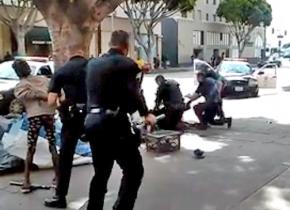On the march against LAPD killers
reports from Los Angeles on the anger and protest that has erupted since Los Angeles police killed a homeless Black man on skid row.
OUTRAGED AT the police shooting of a homeless man, hundreds of people took the streets of Los Angeles on March 3, marching from the site on Skid Row where Charley Robinet was shot to the Los Angeles Police Department (LAPD) headquarters, where some went inside and aired their grievances at the Police Commission meeting.
In this latest chilling video of a cop-on-civilian shooting, three officers tussle with the 39-year-old homeless Black man and then fire five shots, killing the man while he lay on his back. Robinet, a French national who was known by the moniker "Africa" by Skid Row residents, was reportedly living among the area's homeless population for more than four months.
In the YouTube video uploaded by Anthony Blackburn, Robinet and another person can be seen in an altercation with six officers shortly before noon on March 1. While two of the officers managed to wrestle the other person to the ground after she picked up a police baton, Robinet--who was by then lying on his back and being punched by officers near his tent where the initial altercation began--is shot seconds after someone is heard shouting, "Drop the gun!" No gun was recovered.

Already, LAPD officials are making the claim Robinet "reached for the officer's gun." However, witnesses are challenging that familiar narrative, arguing that the incident, which was reportedly initiated because of a robbery/battery call according to the LAPD, could have been handled differently.
"He [did not] have [a] weapon, they just shot him," Yolanda Young, a witness to the killing, told FOX 11. "They could have wrestled him down and took him to jail, but they shot him five times."
Robinet, who residents say told them he had been released from a psychiatric facility after 10 years before settling on Skid Row, which has a huge concentrated homeless population, was frequently harassed and told to move his possessions, which were usually located near the area's Union Rescue Mission.
Ceola Waddell, another witness, told the Los Angeles Times that "Africa" would sit in the same spot "every day." He also said that cops began the confrontation with the homeless man by shaking his tent "like a rag doll" while he was still inside.
LAPD HARASSMENT of Skid Row's homeless population, which includes excessive ticketing, impounding of property and sometimes destruction of belongings, is well documented and known to both residents and local activists. The Los Angeles Community Action Network (LA CAN) has sued the city for "unlawful seizure of property" and has waged a fightback against gentrifying efforts, which have accelerated since the opening of the L.A. Live entertainment complex in 2009 along with construction of the Staples Center, both near Skid Row.
The Safer Cities Initiative (SCI) task force, established in 2006 while current NYPD Commissioner William Bratton was LAPD chief, is another version of the discredited and racist law enforcement pseudo-science known as the "broken windows" theory on policing, whereby cops clamp down with an iron-fist on minor violations, in order to prevent more serious crimes.
Needless to say, SCI has benefited private developers while criminalizing the area's vulnerable homeless population.
The constant harassment of LA's homeless population, along with the killing of Robinet, isn't happening in a vacuum. The LA City Council is considering a return of anti-vagrancy laws and ordinances, which are being disguised to supposedly address the "storage of personal property in public places." A proposed ordinance is so vague and far-reaching that even the always cop apologist Los Angeles Times opposes it.
As far as California--home to the nation's largest homeless population--goes, criminalizing homelessness isn't exclusive to LA. A recent study released by the Berkeley Law School's Policy Advocate Clinic examined municipal codes in 58 cities throughout the state and found that among other goals, the laws had the effect of making the unhoused "someone else's problem."
Over-policing and criminalizing the unhoused, many of whom suffer from mental illness, is a classic misguided case of attacking the symptoms while ignoring the root socio-economic causes of homelessness. Instead of cities such as LA diverting and earmarking disproportionate amounts of funds to further militarize the police, those resources would be better served for constructing mental health facilities, subsidized housing and a myriad of other social welfare programs.
Nothing less than a mass movement, guided by self-mobilization and organization along with the understanding that the for-profit capitalist system lies at the heart of systemic problems like police terror and homelessness and must be uprooted, will stop the killings of men like Robinet.


